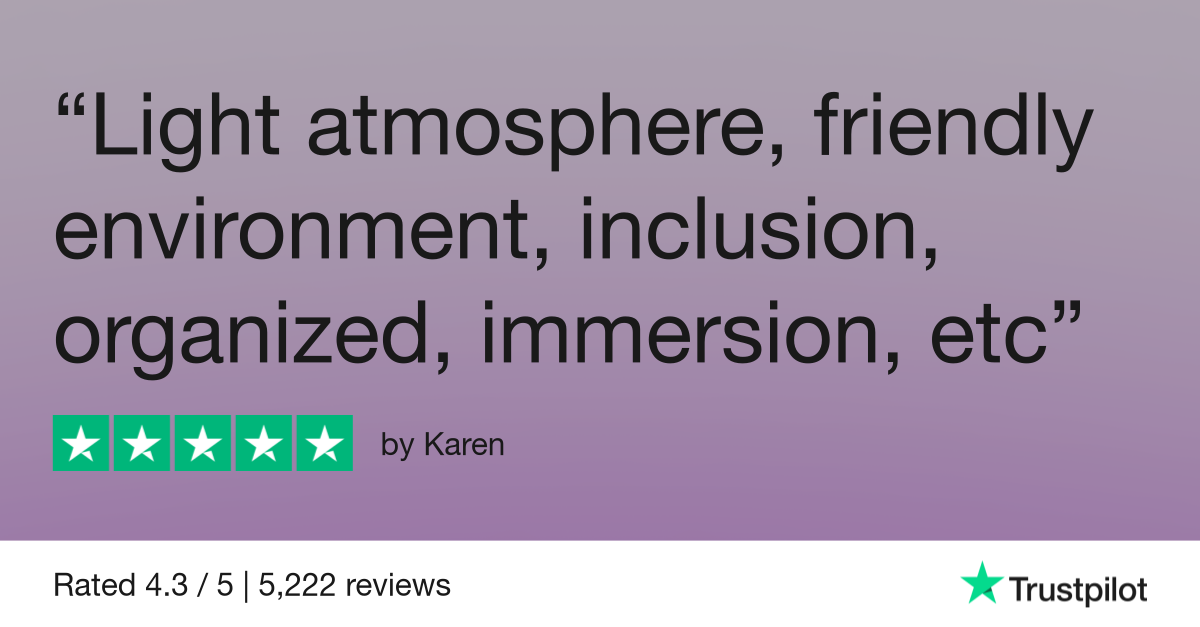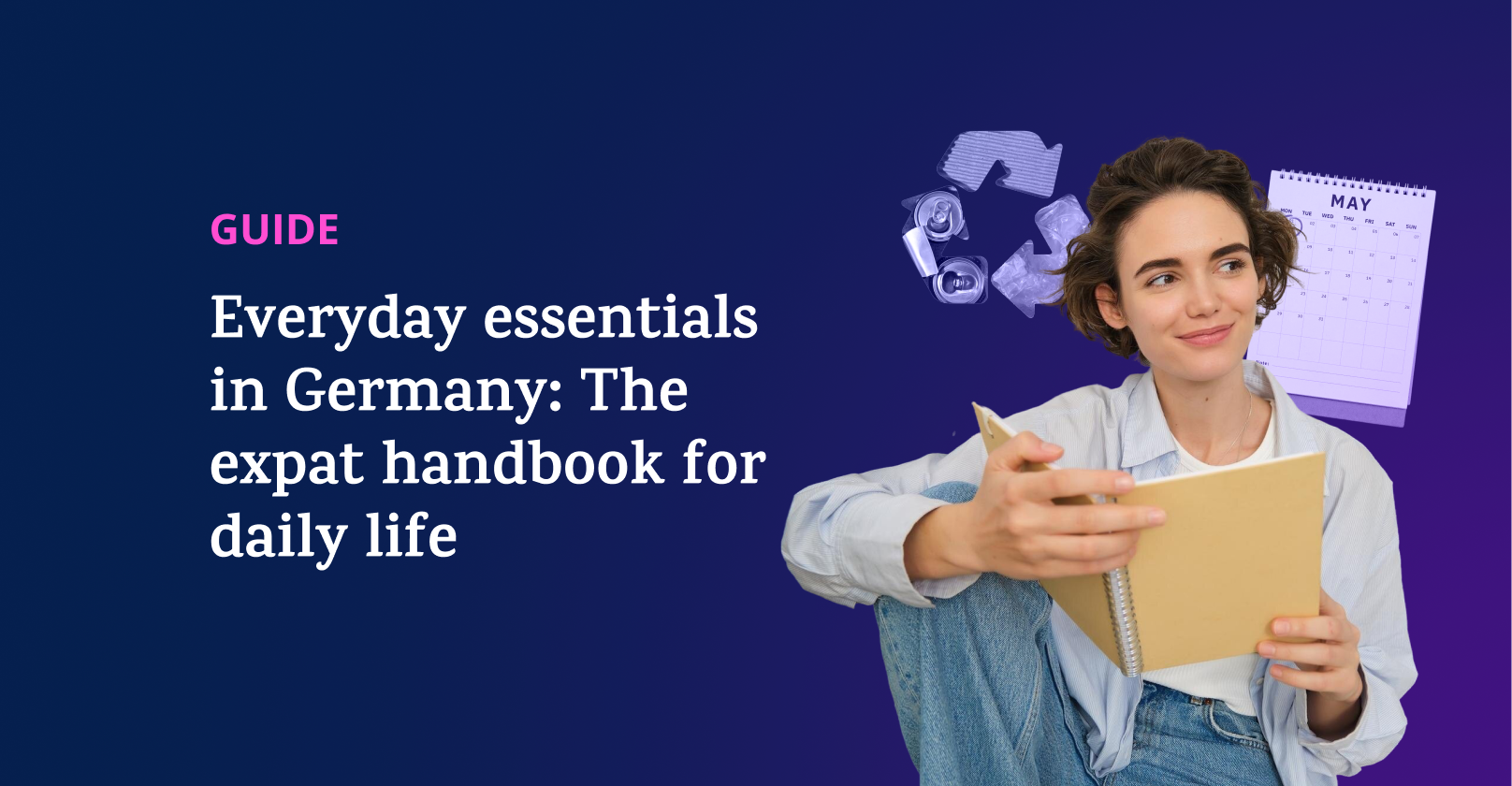‘Haben’ conjugation in German: Forms, tenses and uses

Few German verbs come up as regularly in daily conversation as haben. This all-important verb means “to have,” and it’s used to talk about everything from possession to personal experience. Haben also plays a key role in German as an auxiliary verb.
In this guide, you’ll learn how to conjugate haben in every tense. We’ll run through some practical examples and demonstrate when (and why) to use haben instead of sein.
- What does haben mean and why is it important?
- Haben in the present tense (Präsens)
- Haben in the simple past (Imperfekt)
- Haben in the present perfect (Perfekt)
- Haben in the past perfect (Plusquamperfekt)
- Haben in the future tense (Futur I and Futur II)
- Haben in the subjunctive mood (Konjunktiv I and Konjunktiv II)
- Haben as an auxiliary verb
- FAQs
What does ‘haben’ mean and why is it important?
The German word haben means “to have.” It belongs to a special category of verbs in German that have two roles.
In the first of these roles, haben functions as a main verb that indicates possession (e.g., Ich habe eine Schwester. → I have a sister.).
In its second role, haben functions as an auxiliary verb. When used as an auxiliary verb, haben contributes to the formation of the present perfect (Perfekt) and the past perfect (Plusquamperfekt) tenses.

Learn German with Lingoda
How it works

‘Haben’ in the present tense (‘Präsens’)
If you want to express that something belongs to you or is currently in your possession, use the present tense of haben. This form is especially important to learn because it’s also used to form the present perfect tense.
Here’s how haben is conjugated in the present tense for the different subjects in German:
| Subject | Form | English |
| ich | habe | I have |
| du | hast | you have (informal, singular) |
| er/sie/es | hat | he/she/it has |
| wir | haben | we have |
| ihr | habt | you have (informal, plural) |
| sie/Sie | haben | they/you have (formal) |
Present tense usage examples
Now that you know how haben is conjugated in the present tense, you’re probably wondering how it can be used in German sentences. Here are some examples:
| German | English |
| Ich habe heute keine Probe. | I don't have practice today. |
| Du hast eine schöne Wohnung. | You have a nice apartment. |
| Er hat einen neuen Freund. | He has a new friend. |
| Sie hat lange Haare. | She has long hair. |
| Es hat keinen Sinn. | It doesn't make sense. |
| Wir haben morgen eine Prüfung. | We have an exam tomorrow. |
| Sie haben viele Katzen. | They have many cats. |
| Morgen haben Sie einen Termin. | You (formal) have an appointment tomorrow. |
‘Haben’ in the simple past (‘Imperfekt’)
Of course, you’re not always talking about having something in the present tense. Sometimes, you need to express that something once belonged to you in the past. The first form of the past tenses, the simple past, is also called the Präteritum or Imperfekt in German. It looks like this:
| Subject | Form | English |
| ich | hatte | I had |
| du | hattest | you had (informal, singular) |
| er/sie/es | hatte | he/she/it had |
| wir | hatten | we had |
| ihr | hattet | you had |
| sie | hatten | they had |
Simple past tense usage examples
In the following table, we provide some examples for the usage of haben in the simple past.
| German | English |
| Ich hatte gestern frei. | I had the day off yesterday. |
| Du hattest einen tollen Urlaub. | You had a great holiday. |
| Sie hatte viele Fragen. | She had many questions. |
| Wir hatten kein Internet. | We had no internet. |
| Ihr hattet viel Glück. | You were very lucky. |
| Sie hatten ein schönes Haus. | They had a beautiful house. |
When to use ‘Imperfekt’ vs. ‘Perfekt’
If you’ve been learning German for a while, you might have noticed that the Imperfekt is rarely used in spoken conversations. This is not only true for the simple past of haben, but for all German verbs.
Most of the time, German speakers use the Perfekt tense in conversations, because it sounds more natural to them. While the simple past is still used in written German, it has almost fully disappeared from spoken German. Although no one will think you’re strange for using it, try to avoid the simple past when speaking if your goal is to sound more like a native.
‘Haben’ in the present perfect (‘Perfekt’)
Forming the ‘Perfekt’ with ‘haben’
As mentioned above, we need the present tense of the verb haben and the past participle of the main verb to form the present perfect in German. So, what happens if we want to use the present perfect of haben? You guessed right: we use the same structure.
Form the present perfect with a version of haben in the present tense and the past participle gehabt. The table below shows how to do this for each of the German subjects:
| Subject | Form | English |
| ich | habe gehabt | I have had |
| du | hast gehabt | you have had (singular) |
| er/sie/es | hat gehabt | he/she/it has had |
| wir | haben gehabt | we have had |
| ihr | habt gehabt | you have had (plural) |
| sie | haben gehabt | they have had |
Practical use cases in conversation
The participle gehabt appears when talking about past possession or experiences. For example:
- Ich habe gestern Kopfschmerzen gehabt. (I had a headache yesterday.)
- Er hat viel Stress gehabt. (He was very stressed.)
‘Haben’ in the past perfect (‘Plusquamperfekt’)
The past perfect tense in German is not used very often. But it does fulfill a certain important function. It can be used to express events that have happened before another past event. Here’s an example:
- Ich hatte schon gegessen, bevor ich in das Restaurant kam. (I had already eaten before I entered the restaurant.)
For the listener, it becomes clear that one action (eating) happened even further in the past than the other action (entering the restaurant).
When you want to form the past perfect tense of haben, it looks like this:
| Subject | Form | English |
| ich | hatte gehabt | I had had |
| du | hattest gehabt | you had had |
| er/sie/es | hatte gehabt | he/she/it had had |
| wir | hatten gehabt | we had had |
| ihr | hattet gehabt | you had had |
| sie | hatten gehabt | they had had |
‘Haben’ in the future tense (‘Futur I’ and ‘Futur II’)
There are two future tenses in German: Futur I and Futur II. While both of them serve different purposes, you’ll seldomly hear someone use Futur II because it can make sentences overly complicated. Most German speakers avoid it in natural conversations.
With that in mind, let’s start with Futur I.
‘Futur I’ – Talking about future events
Futur I is used to talk about future events that are about to happen. To form it, combine a conjugated form of werden with the infinitive of your main verb.
In the case of haben, the structure looks like this:
(conjugation of) werden + haben (infinitive form)
Here’s an example:
- Ich werde morgen Abend mehr Zeit haben. (I will have more time tomorrow evening.)
| Subject | Form | English |
| ich | werde haben | I will have |
| du | wirst haben | you will have |
| er/sie/es | wird haben | he/she/it will have |
| wir | werden haben | we will have |
| ihr | werdet haben | you will have |
| sie | werden haben | they will have |
‘Futur II’ – Describing completed future actions
There’s a reason why Futur II is seldomly used in spoken German conversations: sentences can become overly long when it’s used. To form the Futur II of haben, combine:
(conjugation of) werden + gehabt (past participle) + haben (infinitive)
Here’s an example:
- Am Ende des Monats wirst du genug Geld gehabt haben. (By the end of the month, you will have had enough money.)
The table shows you what that looks like for each of the subjects:
| Subject | Form | English |
| ich | werde gehabt haben | I will have had |
| du | wirst gehabt haben | you will have had (singular) |
| er/sie/es | wird gehabt haben | he/she/it will have had |
| wir | werden gehabt haben | we will have had |
| ihr | werdet gehabt haben | you will have had (plural) |
| sie | werden gehabt haben | they will have had |
‘Haben’ in the subjunctive mood (‘Konjunktiv I’ and ‘Konjunktiv II’)
Haben can also be used in reported speech or when you want to be polite — when you’re ordering a coffee in German, for instance. In the following, you’ll learn how to use haben in the subjunctive mood.
‘Konjunktiv I’ for reported speech
The Konjunktiv I is used for reported speech. Use it when you want to quote someone or when you’re not quite sure if a piece of information is correct. Mostly, we use the Konjunktiv I for papers or in literature. It’s seldomly used in direct speech.
Here’s an example:
- Manche sagen, er habe eine Katze. (Some say, he has a cat.)
| Subject | Form | English |
| ich | habe | (that) I have |
| du | habest | (that) you have |
| er/sie/es | habe | (that) he/she/it has |
| wir | haben | (that) we have |
| ihr | habet | (that) you have |
| sie | haben | (that) they have |
‘Konjunktiv II’ for hypotheticals
Konjunktiv II is used to express hypothetical situations. It’s very common to use the Konjunktiv II to express politeness in German. Here’s an example of what this looks like for the verb haben:
- Ich hätte gerne ein Stück Kuchen. (I’d like to have a piece of cake.)
| Subject | Form | English |
| ich | hätte | I would have |
| du | hättest | you would have |
| er/sie/es | hätte | he/she/it would have |
| wir | hätten | we would have |
| ihr | hättet | you would have |
| sie | hätten | they would have |
‘Haben’ as an auxiliary verb
In German, haben functions as an auxiliary verb (Hilfsverb) to form compound tenses such as the present perfect (Perfekt), past perfect (Plusquamperfekt) and future perfect (Futur II).
These tenses are used to describe completed actions in the present, past or future. The auxiliary verb haben is combined with the past participle (Partizip II) of the main verb.
Here’s what that looks like for the different tenses:
| Tense | German | English |
| Perfekt | Ich habe gelitten. | I have suffered. |
| Plusquamperfekt | Ich hatte gelitten. | I had suffered. |
| Futur II | Ich werde gelitten haben. | I will have suffered. |
In German, the choice between the auxiliary verbs haben and sein depends on the main verb. Most verbs are paired with haben, especially when they have a direct object or describe a general action. For example, Ich habe das Buch gelesen (I have read the book) uses haben, because lesen (to read) is a transitive verb.
In contrast, sein is used with a smaller group of intransitive verbs that express movement or a change of state, such as gehen (to go), kommen (to come) and aufstehen (to get up). These verbs don’t take a direct object and often describe a transition or motion from one place or condition to another. So, a sentence like Er ist nach Hause gegangen (He has gone home) would use the appropriately conjugated form of sein (in this case, ist).
What is the conjugation of haben in the present tense?
In the present tense, haben is an irregular verb and changes depending on the subject. The forms are: ich habe, du hast, er/sie/es hat, wir haben, ihr habt and sie haben.
Is haben a regular or irregular verb in German?
Haben is an irregular verb in German. Its stem changes in some forms, such as du hast and er hat, rather than following the regular conjugation pattern.
From charts to confidence: Learn the ‘haben’ conjugation
The German verb haben helps you express possession, form perfect tenses, and structure complex sentences. Haben appears in almost every conversation. In this guide, you’ve learned how haben functions in the present, past, perfect and future tenses, as well as in the subjunctive mood and as an auxiliary verb.
Knowing how to use haben is essential for German learners, which is why it’s part of the German A1 curriculum when you learn German with Lingoda. With native-level teachers, small group classes and a CEFR-aligned curriculum, you’ll enhance your German skills when it best fits your schedule.

Learn German with Lingoda
How it works

















